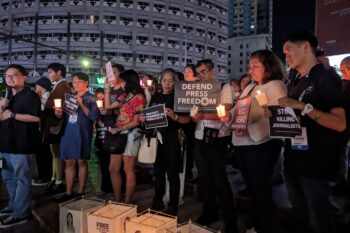"There is no reason to make this crisis now the true and only crisis of all Filipinos, which it is not," Ramos said in a press conference at Lanang Golf and Country Club here at noon, before flying back to Manila.
Ramos, who flew here Friday to speak at the University of the Philippines in Mindanao, said elected government officials as well as sectors like the media, business and the academe should also look into other “crisis” affecting the country and which needs immediate attention.
He said that in his meeting with different sectors in Mindanao recently, he was told that their concern mainly revolves on livelihood, education, trade, investments, tourism and the security situation.
Ramos warned the country “will get nowhere” if the other problems are not given attention by government leaders as well as of the media, the business and education sectors because of their “focus” on alleged overpricing and bribery in the NBN deal.
The reported corruption in the NBN deal, which linked China’s ZTE Corporation, First Gentleman Miguel Arroyo, former Elections Commission chair Benjamin Abalos and other officials, has sparked a wave of protests in Manila and other key cities nationwide. Some of the protesters demanded for truth in the deal as well as the immediate resignation of President Arroyo.
“What is happening on the political level, even if that is at the national level, should not be the end-all and the be-all of all of government’s efforts including media’s efforts,” Ramos said.
Ramos, however, clarified that even as he called on the various sectors to pay attention on other problems affecting the country, he does not want the investigations on the alleged controversial deal be stopped “because the truth of the matter has not yet emerged.”
Ramos also noted that four levels of investigations on the deal are going on: the Senate Blue Ribbon Committee, the Office of the Ombudsman, the Department of Justice and a Malacanang cabinet body.
Elaborating on his description of the current political crisis as a mere “blip” in recent political affairs, Ramos said the problem should be seen in the context of one “generation” of Philippine leaders, which is roughly equivalent to 25 years.
He noted that under his administration, there were no coup attempts nor even “a movement of any significance” that brought about a political crisis.
Ramos said the present crisis may be traced to 2005, when, following the expose on the “Hello Garci” conversations between President Arroyo and elections commissioner Virgilio Garcillano, some members of the Cabinet or the so-called “Hyatt 10,” resigned on the same day former President Corazon Aquino and then Senate President Franklin Drilon urged the President to resign.
“Its really just a blip in this generation of leaders. Generation meaning 20 to 25 years,” he said.
Ramos said many of the “scandals” affecting President Gloria Macapagal Arroyo as well as his predecessor, President Joseph Estrada may yet be a result of lack of venue wherein they could exercise “harmony and teamwork” with other leaders of government.
Ramos noted that during his time, he institutionalized the Legislative-Executive Development Advisory Council (Ledac) as a mechanism wherein Congress and Malacanang could discuss various problems affecting the country. He said the Ledac, which includes the President, administration and opposition leaders of Congress as well as other sectoral leaders, met every Wednesday morning while Congress was in session.
Ramos said under the Estrada administration, the Ledac met only once or twice a year. Ramos said that in the case of President Arroyo, she was reported to have said that she would convene the Ledac three months after his last meeting with her in December last year.
Ramos said the “beauty” of having a Ledac with an agenda approved and known to all its members, is that leaders are compelled to do their “homework” and ensure that the solutions to the problems of government are “fairly well on target. He said through the Ledac, “small problems” are prevented from blossoming into “national scandals.”
Ramos said he adopted the institutionalization of the Ledac in an “Asian family” tradition of discussions and reaching consensus on solving problems problems. He described these traditions as “Mushawara,” a meeting based on dialogue; and “Mufakat” or the need to come up with consensus.
He said that he hoped that frequent meetings in the Ledac would be done by the current administration. (Jowel F. Canuday/MindaNews)
